Fleurs du Mal Magazine


Or see the index
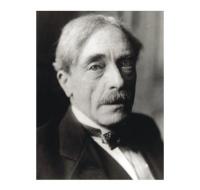
Hélène
Azur ! c’est moi… Je viens des grottes de la mort
Entendre l’onde se rompre aux degrés sonores,
Et je revois les galères dans les aurores
Ressusciter de l’ombre au fil des rames d’or.
Mes solitaires mains appellent les monarques
Dont la barbe de sel amusait mes doigts purs ;
Je pleurais. Ils chantaient leurs triomphes obscurs
Et les golfes enfuis aux poupes de leurs barques.
J’entends les conques profondes et les clairons
Militaires rythmer le vol des avirons ;
Le chant clair des rameurs enchaîne le tumulte,
Et les Dieux, à la proue héroïque exaltés
Dans leur sourire antique et que l’écume insulte,
Tendent vers moi leurs bras indulgents et sculptés.
Paul Valéry
(1871-1945)
Hélène
Poème
• fleursdumal.nl magazine
More in: Archive U-V, Archive U-V, Valéry, Paul
First complete translation into English by Kathleen McNerney and Helena Buffery ⊕ Contains the most beautiful prose I’ve ever read in Catalan – Anna Murià, novelist and translator
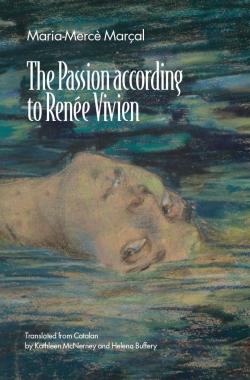 In this often poetic and lyrical novel by the revered Catalan poet Maria-Mercè Marçal, we are taken on a journey through the multiple, mobile and contradictory life, letters and loves of the fin-de-siècle Anglo-French writer, Pauline Tarn-Renée Vivien, as researched and reimagined by two principal narrators – a 1980s Catalan documentary film-maker Sara T. and a 1920s French archaeology scholar and museologist Salomon Reinach – alongside the voices of the various friends, relations, lovers, companions and servants who made her acquaintance at different moments in her life.
In this often poetic and lyrical novel by the revered Catalan poet Maria-Mercè Marçal, we are taken on a journey through the multiple, mobile and contradictory life, letters and loves of the fin-de-siècle Anglo-French writer, Pauline Tarn-Renée Vivien, as researched and reimagined by two principal narrators – a 1980s Catalan documentary film-maker Sara T. and a 1920s French archaeology scholar and museologist Salomon Reinach – alongside the voices of the various friends, relations, lovers, companions and servants who made her acquaintance at different moments in her life.
In the process, we are presented with a compelling reconstruction of the Belle Époque and interwar years in Paris, alongside other key sites in this transformational literary geography – Nice, Bayreuth, Switzerland, Istanbul, and the island of Lesbos – that include often dazzling evocations of other cultural figures and influencers of the age, from Zola to Pierre Louÿs and Remy de Gourmont, Liane de Pougy to Mathilde de Morny and Colette, not forgetting the central figure of Natalie Clifford-Barney, the ‘Amazone’.
Maria-Mercè Marçal:
The Passion according to Renée Vivien
Translation into English by Kathleen McNerney and Helena Buffery
Francis Boutle publishers
ISBN 9781916490659
Language: English
Format: paperback
Number of pages 354
£12
»» website Francis Boutle publishers
# new books
Maria-Mercè Marçal:
The Passion according to Renée Vivien
• fleursdumal.nl magazine
More in: - Book News, - Book Stories, Archive M-N, Archive U-V, Archive U-V, Émile Zola, Renée Vivien, Vivien, Renée
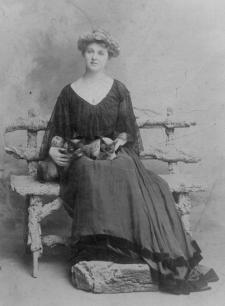
Victoire
Donne-moi tes baisers amers comme des larmes,
Le soir, quand les oiseaux s’attardent dans leurs vols.
Nos longs accouplements sans amour ont les charmes
Des rapines, l’attrait farouche des viols.
Repousse, délivrant ta haine contenue,
Le frisson de ma bouche éprise de ta chair.
Pour crier ton dégoût, dresse-toi, froide et nue,
Comme un marbre funèbre aux lueurs d’un éclair.
Tes yeux ont la splendeur auguste de l’orage…
Exhale ton mépris jusqu’en ta pâmoison,
O très chère ! — Ouvre-moi tes lèvres avec rage :
J’en boirai lentement le fiel et le poison.
J’ai l’émoi du pilleur devant un butin rare,
Pendant la nuit de fièvre où ton regard pâlit…
L’âme des conquérants, éclatante et barbare,
Chante dans mon triomphe au sortir de ton lit
Renée Vivien
born Pauline Mary Tarn;
(1877–1909)
Victoire;
Etudes et préludes
• fleursdumal.nl magazine
More in: Archive U-V, Archive U-V, Renée Vivien, Vivien, Renée

Vers d’amour
Tu gardes dans tes yeux la volupté des nuits,
O Joie inespérée au fond des solitudes!
Ton baiser est pareil à la saveur des fruits
Et ta voix fait songer aux merveilleux préludes
Murmurés par la mer à la beauté des nuits.
Tu portes sur ton front la langueur et l’ivresse,
Les serments éternels et les aveux d’amour,
Tu sembles évoquer la craintive caresse
Dont l’ardeur se dérobe à la clarté du jour
Et qui te laisse au front la langueur et l’ivresse.
Renée Vivien
born Pauline Mary Tarn;
(1877–1909)
Vers d’amour;
Cendres et Poussières, 1902
• fleursdumal.nl magazine
More in: Archive U-V, Archive U-V, Renée Vivien, Vivien, Renée
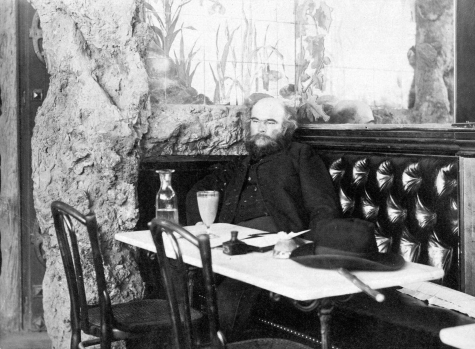
Paul Verlaine drinkt absint in een Café.
(Foto van Paul François Arnold Cardon a.k.a. Dornac, 1892)
Blue in Green
Je vindt uiteindelijk je vrouw
en in het coloriet van wouw
en wede stuit je op verdriet.
De insecten vliegen af en aan,
in goud, smaragd en malachiet,
hun schaduw rillend van cyaan.
En in de luister van de vliet,
in het gefluister van het riet,
dient nieuwe poëzie zich aan.
Paul Bezembinder
Paul Bezembinder studeerde theoretische natuurkunde in Nijmegen. In zijn poëzie zoekt hij in vooral klassieke versvormen en thema’s naar de balans tussen serieuze poëzie, pastiche en smartlap. Zijn gedichten (Nederlands) en vertalingen (Russisch-Nederlands) verschenen in verschillende (online) literaire tijdschriften. Voorbeelden van zijn werk zijn te vinden op zijn website: www.paulbezembinder.nl
• fleursdumal.nl magazine
More in: Archive A-B, Archive U-V, Bezembinder, Paul, Opium-Eaters, Verlaine, Paul
De debuutroman van de dichter Ocean Vuong is een schokkend familieportret en een indringend relaas van een eerste liefde, waarin de bezwerende kracht van taal en verhalen wordt aangewend als middel om te overleven en kloven te overbruggen.
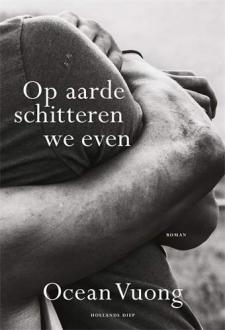 Op aarde schitteren we even is een brief van een zoon aan zijn moeder die niet kan lezen.
Op aarde schitteren we even is een brief van een zoon aan zijn moeder die niet kan lezen.
De schrijver van de brief, de achtentwintigjarige Hondje, legt een familiegeschiedenis bloot die voor zijn geboorte begon – een geschiedenis waarvan het brandpunt in Vietnam ligt. Daarnaast verschaft hij toegang tot delen van zijn leven waar zijn moeder nooit van heeft geweten, en doet hij een onvergetelijke onthulling.
De roman is behalve een getuigenis van de problematische maar onmiskenbare liefde tussen een alleenstaande moeder en haar zoon, ook een genadeloos eerlijk onderzoek naar ras, klasse en mannelijkheid. Op aarde schitteren we even stelt vragen die centraal staan in het Amerika van nu, dat ondergedompeld is in verslaving, geweld en trauma.
Het is een roman vol mededogen en tederheid over de kracht van je eigen verhaal vertellen en over de vernietigende stilte van niet gehoord worden.
Met verbluffende urgentie en elegantie schrijft Ocean Vuong over mensen die klem zitten tussen onverenigbare werelden, en onderzoekt hij hoe we elkaar kunnen genezen en redden zonder te verloochenen wie we zijn. De vraag hoe we moeten overleven, en hoe we daar een soort vreugde aan kunnen ontlenen, is de drijvende kracht van de belangrijkste debuutroman sinds jaren.
Ocean Vuong (1988) is dichter, essayist en schrijver. Stukken van zijn hand verschenen o.a. in The Atlantic, Harper’s en The New Yorker. Hij werd geboren in Saigon en emigreerde in 1990 met zijn familie naar de VS. Zijn familie bestaat voor een groot deel uit dyslectici en zelf leerde hij pas op zijn elfde lezen. Desondanks won hij met zijn veelgeprezen poëziedebuut Night Sky With Exit Wounds een aantal grote literaire prijzen zoals de Whiting Award en de T.S Elliot Prize. Op aarde schitteren we even is zijn romandebuut.
Ocean Vuong
Op aarde schitteren we even
Vertaling: Johannes Jonkers
Uitgeverij Hollands Diep
Paperback
240 p.
ISBN: 9789048846832
Verschijnt op 03-09-2019
€ 21.99
# new books
Ocean Vuong
novel
• fleursdumal.nl magazine
More in: - Book News, - Book Stories, Archive U-V, Archive U-V, Art & Literature News, Ocean Vuong
Mort d’une surdose d’opium en 1919 à l’âge de vingt-trois ans, alors qu’il est encore sous l’uniforme, Jacques Vaché est reconnu comme celui par qui le surréalisme est arrivé.
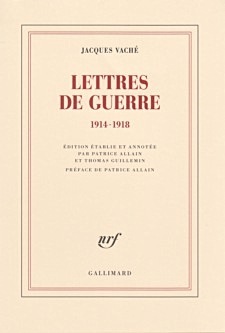 Du premier Manifeste à ses derniers Entretiens, André Breton aura toujours célébré celui qu’il appelait «l’homme que j’ai le plus aimé au monde».
Du premier Manifeste à ses derniers Entretiens, André Breton aura toujours célébré celui qu’il appelait «l’homme que j’ai le plus aimé au monde».
Et quinze Lettres de guerre, envoyées depuis le front à son ami poète ainsi qu’à Théodore Fraenkel et Louis Aragon, auront suffi pour que Vaché devienne l’arme secrète de plusieurs générations.
Breton révélait en 1919 son «Umour» sans H, surgi au milieu des combats, l’expression poétique la plus pure de l’humour noir et de la «désertion intérieure».
Présenter pour la première fois l’intégralité des lettres écrites par Jacques Vaché à sa famille et à ses amis pendant la guerre (158 dont 23 totalement inédites) permet de marquer le point de départ d’une aventure moderne et de mettre en lumière le soldat en action, la vocation prometteuse du dessinateur et la singularité du «dandy des tranchées».
Jacques Vaché:
Lettres de guerre (1914-1918)
Édition de Patrice Allain et Thomas Guillemin.
Préface de Patrice Allain
Collection Blanche, Gallimard
Parution: 08-11-2018
480 pages,
ill.,
140 x 205 mm
Achevé d’imprimer: 01-10-2018
Genre : Correspondances
Prix: 24,00 €
# new books
Jacques Vaché:
Lettres de guerre (1914-1918)
fleursdumal.nl magazine
More in: #Biography Archives, *War Poetry Archive, - Book News, - Bookstores, Archive U-V, Archive U-V, Art & Literature News, Jacques Vaché, Opium-Eaters, Vaché, Jacques
‘Van de Ven is een opvallende verschijning in het peloton van wielerauteurs. Zijn forse postuur en woeste baard hebben hem de bijnaam Raspoetin bezorgd.
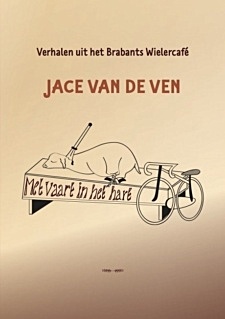 Verwacht geen geschoren benen, carbon frames en wetenschappelijk verantwoorde sportdrank,’ schreef het magazine for art en literature ‘Fleursdumal.nl’ over ‘Mag ik nog wat wind van achteren?’, de vorige bundel wielerverhalen van Jace van de Ven.
Verwacht geen geschoren benen, carbon frames en wetenschappelijk verantwoorde sportdrank,’ schreef het magazine for art en literature ‘Fleursdumal.nl’ over ‘Mag ik nog wat wind van achteren?’, de vorige bundel wielerverhalen van Jace van de Ven.
En Het is koers.nl noteerde: ‘Het zijn persoonlijke beslommeringen opgedaan tijdens vaak meerdaagse fietstochten, die bij mij de juiste snaar raken en uitnodigen om zelf te fietsen, te lachen, te genieten en na te denken.’
Ook Brabants Dagblad en Brabant Cultureel waren enthousiast. Buiten Noord-Brabant is de continue verwondering van Jace van de Ven, eerste stadsdichter van Tilburg, over coureurs en would-be-renners nog te onbekend. Jammer, want niemand schrijft zo hilarisch en tegelijk zo ontroerend over mensen op de fiets, of het nou sterren zijn of stumpers. Dat bewijzen de vijftien verhalen in ‘ Met vaart in het hart’ opnieuw.
Jace van de Ven is oud-redacteur van Brabants Dagblad en eerste stadsdichter van Tilburg. Als auteur van wielerverhalen wordt hij regelmatig uitgenodigd om zijn verhalen voor te lezen voor wielerverenigingen. De vele verzoeken om zijn teksten eens in boekvorm uit te brengen heeft hij nu gehonoreerd in deze handzame bundeling van zijn mooiste verhalen. Geschreven met wind mee…
JACE van de Ven
Met Vaart In Het Hart.
Verhalen uit het Brabants Wielercafé
Geïllustreerd door Ellis Pruijn
Jaar: 2018
Uitgever: Eigen beheer,
Categorie:
Gedicht / Poëzie / Proza
116 pagina’s:
Afmeting: 15×21 cm
Wielerboek
€ 14,00
# meer info sportmediashop
new books
fleursdumal.nl magazine
More in: - Book Lovers, - Book Stories, Archive U-V, Archive U-V, Art & Literature News, Ven, Jace van de
‘En toch is alles wat we doen natuur’ bevat de mooiste natuurgedichten van dichter-tekenaar-bioloog Leo Vroman.
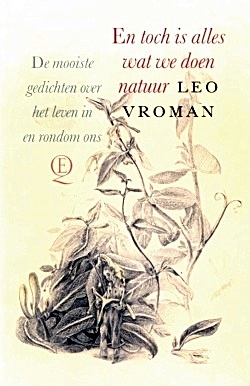 Vroman was gefascineerd door het leven in en rondom ons, dat hij tot in de wonderbaarlijkste details observeerde en beschreef.
Vroman was gefascineerd door het leven in en rondom ons, dat hij tot in de wonderbaarlijkste details observeerde en beschreef.
Tientallen bundels speelse poëzie schreef hij, een onuitputtelijke stroom gedichten van 1946 tot 2014, het jaar van zijn overlijden.
Mirjam van Hengel (auteur van het succesvolle Hoe mooi alles, over Leo en Tineke Vroman) maakte een nieuwe, ruime selectie uit de gedichten die Vroman schreef over de natuur – die van mensen, die van gras, bloemen en bomen, van orkanen en organen en van alle mogelijke dieren.
Leo Vroman (1915-2014) was dichter, prozaïst, essayist, illustrator en hematoloog. Hij studeerde biologie in Utrecht en vluchtte in 1940 naar Nederlands-Indië. In 1945 werd hij uit Japanse gevangenschap bevrijd en vestigde zich in Verenigde Staten, samen met zijn vrouw Tineke. Vroman debuteerde in 1946 met de bundel Gedichten. Vroman ontving in de loop van zijn leven zowat alle belangrijke literaire prijzen die er zijn. In 2006 verscheen het dagboek Misschien tot morgen.
En toch is alles wat we doen natuur
De mooiste gedichten over het leven in en rondom ons
Auteur: Leo Vroman
Redactie: Mirjam van Hengel
Uitgeverij: Querido
Hardcover
Taal: Nederlands
Afmetingen: 31x223x142 mm
Gewicht:481,00 gram
Verschijningsdatum: 6 maart 2018
Druk 1
ISBN10 902140902X
ISBN13 9789021409023
Prijs: € 24,99
# Voor meer informatie ga naar de website: www.vromanfoundation.com
new books
fleursdumal.nl magazine
More in: Archive U-V, Archive U-V, Art & Literature News, Natural history, Vroman, Leo
*Walt Whitman Award Winner 2016
*One of The New Yorker’s Poetry I Was Grateful For in 2017, selected by Dan Chiasson
*One of The Brooklyn Rail’s Best Books of 2017
 “[Afterland] reminds us what a distinctive instrument the human imagination is, no matter what tune it plays. There is a story in this book, and an important one. . . . Vang writes strikingly, often chillingly visual poems, their images projected one at a time, like slides in a lecture, or perhaps in a trial. . . . Afterland works its wonders with an intentionally rationed vocabulary, its counters combined and recombined in poem after poem: stars, water, hair, bones, fire. . . . The style creates an atmosphere of impending marvels, and many of Vang’s poems perform, in words, the transformations that they describe . . . . [Afterland] is among the most satisfying débuts by an American poet in some time.” — The New Yorker
“[Afterland] reminds us what a distinctive instrument the human imagination is, no matter what tune it plays. There is a story in this book, and an important one. . . . Vang writes strikingly, often chillingly visual poems, their images projected one at a time, like slides in a lecture, or perhaps in a trial. . . . Afterland works its wonders with an intentionally rationed vocabulary, its counters combined and recombined in poem after poem: stars, water, hair, bones, fire. . . . The style creates an atmosphere of impending marvels, and many of Vang’s poems perform, in words, the transformations that they describe . . . . [Afterland] is among the most satisfying débuts by an American poet in some time.” — The New Yorker
“When I make the crossing, you must not be taken no matter what the current gives. When we reach the camp,
there will be thousands like us.?
If I make it onto the plane, you must follow me to the roads and waiting pastures of America.
We will not ride the water today on the shoulders of buffalo as we used to many years ago, nor will we forage? for the sweetest mangoes.
I am refugee. You are too. Cry, but do not weep.” — from “Transmigration”
“Afterland has haunted me. I keep returning to read these poems aloud, hearing in them a language at once atavistic, contemporary, and profoundly spiritual. Mai Der Vang confronts the Secret War in Laos, the flight of the Hmong people, and their survival as refugees. That a poet could absorb and transform these experiences in a single generation—incising the page with the personal and collective utterances of both the living and the dead, in luminous imagery and a surprising diction that turns both cathedral and widow into verbs, offering both land and body as swidden (slashed and burned)—is nothing short of astonishing.Here is deep attention, prismatic intelligence, and fearless truth.” — Carolyn Forché, judge’s statement for the Walt Whitman Award
Mai Der Vang
Afterland. Poems
Pages: 104
Pub Date: April 4, 2017
Poetry
Paperback, $16.00
ISBN: 978-1-55597-770-2
2016 Walt Whitman Award winner
new books
fleursdumal.nl magazine
More in: - Book News, - Book Stories, Archive U-V, Archive U-V, Art & Literature News, EDITOR'S CHOICE
An extraordinary debut from a young Vietnamese American, ‘Night Sky with Exit Wounds’ is a book of poetry unlike any other.
 Steeped in war and cultural upheaval and wielding a fresh new language, Vuong writes about the most profound subjects – love and loss, conflict, grief, memory and desire – and attends to them all with lines that feel newly-minted, graceful in their cadences, passionate and hungry in their tender, close attention: ‘…the chief of police/facedown in a pool of Coca-Cola./A palm-sized photo of his father soaking/beside his left ear.’
Steeped in war and cultural upheaval and wielding a fresh new language, Vuong writes about the most profound subjects – love and loss, conflict, grief, memory and desire – and attends to them all with lines that feel newly-minted, graceful in their cadences, passionate and hungry in their tender, close attention: ‘…the chief of police/facedown in a pool of Coca-Cola./A palm-sized photo of his father soaking/beside his left ear.’
This is an unusual, important book: both gentle and visceral, vulnerable and assured, and its blend of humanity and power make it one of the best first collections of poetry to come out of America in years.
Ocean Vuong was born in a rice farm outside Saigon in 1988. At the age of two, after a year in a refugee camp, he and his family arrived in the US. He is the first in his immediate family to learn how to read proficiently, at the age of eleven. With Ben Lerner as his mentor at Brooklyn College, he wrote the poems that would become this first collection. A Ruth Lilly fellow and winner of a Pushcart Prize, he has received honours and awards from Poets House and the Academy of American Poets. Night Sky with Exit Wounds won the 2016 Whiting Award. Ocean Vuong lives in New York.
Ocean Vuong:
Night Sky with Exit Wounds
English
Publ. Jonathan Cape
Published 4th April 2017
96 Pages
129mm x 197mm x 9mm
ISBN10 1911214519
ISBN13 9781911214519
Paperback
€ 11,46
# more information on website TS Eliot Prize
fleursdumal.nl magazine
More in: - Book News, Archive U-V, Art & Literature News, Awards & Prizes, Eliot, T. S., Ocean Vuong
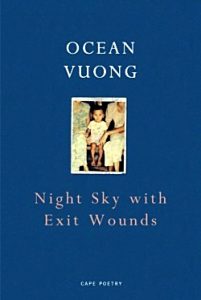 An extraordinary debut from a young Vietnamese American, Night Sky with Exit Wounds is a book of poetry unlike any other. Steeped in war and cultural upheaval and wielding a fresh new language, Vuong writes about the most profound subjects – love and loss, conflict, grief, memory and desire – and attends to them all with lines that feel newly-minted, graceful in their cadences, passionate and hungry in their tender, close attention: ‘…the chief of police facedown in a pool of Coca-Cola. A palm-sized photo of his father soaking beside his left ear.’
An extraordinary debut from a young Vietnamese American, Night Sky with Exit Wounds is a book of poetry unlike any other. Steeped in war and cultural upheaval and wielding a fresh new language, Vuong writes about the most profound subjects – love and loss, conflict, grief, memory and desire – and attends to them all with lines that feel newly-minted, graceful in their cadences, passionate and hungry in their tender, close attention: ‘…the chief of police facedown in a pool of Coca-Cola. A palm-sized photo of his father soaking beside his left ear.’
This is an unusual, important book: both gentle and visceral, vulnerable and assured, and its blend of humanity and power make it one of the best first collections of poetry to come out of America in years.
Biography: Ocean Vuong was born in a rice farm outside Saigon in 1988. At the age of two, after a year in a refugee camp, he and his family arrived in the US.
He is the first in his immediate family to learn how to read proficiently, at the age of eleven. With Ben Lerner as his mentor at Brooklyn College, he wrote the poems that would become this first collection.
A Ruth Lilly fellow and winner of a Pushcart Prize, he has received honours and awards from Poets House and the Academy of American Poets. Night Sky with Exit Wounds won the 2016 Whiting Award. Ocean Vuong lives in New York.
‘These are poems of exquisite beauty, unashamed of romance, and undaunted by looking directly into the horrors of war, the silences of history. One of the most important debut collections for a generation.’ Andrew McMillan
Shortlisted for the 2017 Felix Dennis Prize for Best First Collection
Ocean Vuong
Night Sky with Exit Wounds
Cape Poetry, 2017
96 Pages,
129mm x 197mm x 9mm
fleursdumal.nl magazine
More in: - Book News, Archive U-V, Art & Literature News, Ocean Vuong
Thank you for reading Fleurs du Mal - magazine for art & literature